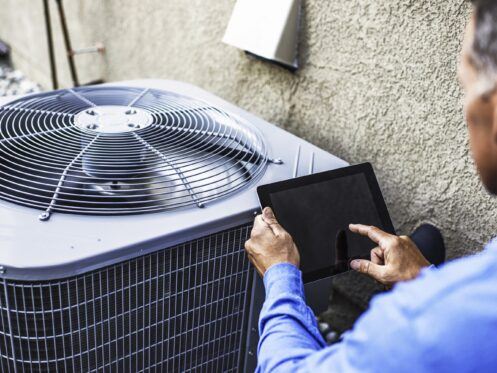Regarding your HVAC system, few things are more frustrating than an AC unit that will not turn on during hot weather. The last thing anyone wants to endure is the lack of air conditioning during sweltering heat. Whether you have health concerns over exposure to stifling heat and humidity or simply want to prepare for the hot temperatures of summer, it is important to fix a non-working air conditioner as quickly as possible. From maintenance issues to old age, there are several possible reasons your air conditioner may not turn on when needed. A look at the best ways to approach troubleshooting your AC unit can help you maximize the chances of getting air conditioning flowing again.
How Do AC Units Work?
To recognize what to do when an AC unit does not turn on correctly, it is helpful to understand how your AC unit works. According to the U.S. Department of Energy, an air conditioner is a large appliance that uses refrigeration to provide cold indoor air. Air conditioners extract heat from the air inside of a room, processing it through a refrigerant cycle in order to transfer it outside. Most AC units have three main parts: the AC compressor, the condenser, and the evaporator. The compressor and condenser often sit outside of the home in the outdoor section of the unit, while the evaporator usually sits inside with the AC handler.
To start the process, the AC unit pulls warm air into a vent. After passing through a filter, the warm air blows over the evaporator. Cold refrigerant absorbs the heat, and the now-cool air blows back into the room, cooling off the surroundings. Next, the refrigerant then flows to the compressor. The compressor squeezes the refrigerant, causing its volume to drop and its temperature to rise. This combination of heat and pressure converts the refrigerant into high-pressure gas. This super-hot gas then travels to the condenser coils that expel the heat so that it can evaporate in outdoor air. The refrigerant instantly cools, converting from a gas back to its original liquid form. Finally, this cold liquid refrigerant flows back into the indoor unit to repeat the cycle. Air conditioners that work properly can complete consistent cycles without issues.
What Should I Do When an AC Unit Will Not Turn On?
Given the steps involved for the AC cycle to work, it is easy to see that there are several components to consider when the air conditioner will not turn on immediately. Instead of tackling the problem on your own, it is important to contact a local HVAC professional to diagnose potential causes and fix any issues. There are several areas within the air conditioning unit that the HVAC specialist might check to determine the source of malfunction. An overview of the common components can prepare you for the HVAC services visit and help you understand the areas you can expect troubleshooting to cover.
Check the Thermostat
Thermostat malfunction is one of the most common causes of an air conditioner that will not turn on properly. In simple terms, the thermostat is your way of communicating with the AC. When the thermostat stops working, it can have a negative influence on your air conditioner’s overall performance. The first step entails checking the display to see whether the thermostat appears lit. If the thermostat is off or unlit, it cannot send signals to the AC. The next step involves checking the batteries or power connection of the unit. If the battery or power connection is fine, another step would involve checking the thermostat’s settings. Most thermostats should remain on the “cool” setting and set approximately five degrees lower than the average indoor temperature. Sometimes, resetting the thermostat will enable the AC to reboot and turn on once more.
If a thermostat reset does not work, the HVAC professional may need to remove the thermostat and check its internal components. For example, an HVAC technician might need to check for debris or corrosive buildup. Some broken thermostats are the result of loose parts or worn-out wiring. And if your thermostat has an electrical problem like a blown fuse or faulty sensor, the HVAC professional may need to repair or replace it.
Check the Refrigerant
A low refrigerant level is another possible reason that an air conditioner might not turn on correctly. The refrigerant is a cooling liquid that resides within an air conditioner’s coils. This fluid is essential in providing cool air during the AC cycle. Although some people believe that refrigerant shortage is the result of a unit simply using up the fluid, most refrigerant shortages are actually the result of leakage. Cracks or fissures in the AC coils can lead to leakage, and too much leakage can eventually cause the unit to corrode. When this occurs, the unit will not turn on as it normally should. Correcting refrigerant shortage is not just about refilling the fluid. The reason is that refrigerant levels must exactly match industry standards and those established through the AC manufacturer. It is important to contact an HVAC professional to measure refrigerant levels, determine the source of the leakage, and correct any damage.
Check the Circuit Breaker
An air conditioner can also fail to turn on when a building’s circuit breaker has stalled or “tripped.” The circuit breaker or breaker box is a safety tool that turns the power off in the event of sudden heavy voltage. If a household has too many appliances plugged in simultaneously, the connected circuit breaker can experience overload. This overload can also occur when a storm causes power surges in the electricity grid. The circuit breaker’s response to an overload is to switch the power off completely. If your circuit breaker consistently trips up, it is important to contact an expert to fix the issue. Attempting to fix it yourself can lead to serious problems and result in electric fires in the very worst cases. A home services professional can correct the issue so that your AC unit begins working again.
Check the Condenser
Condenser problems are another possible reason that air conditioners might not turn on correctly. The purpose of the condenser is to release heat into the outdoor environment. If the condenser is unplugged or if the wiring becomes damaged, the AC unit can malfunction. Without regular maintenance, the condenser can also accumulate dirt and debris over time. This debris can act as an unwanted insulator and cause your unit to work overtime to expel heat. If a condenser works too hard for too long, it can cause a power surge that trips the circuit breaker and prevents your unit from booting up correctly. You should contact a professional HVAC company to repair major condenser issues.
Check the Capacitator
Capacitors play an important role in an HVAC system. They are connected to the motor circuit and help ensure that the air conditioner continues running. There are two types of capacitators: the start capacitator and the run capacitator. Start capacitors help supply the voltage necessary to initiate the motor, and run capacitors help sustain the motor’s operation. Problems like overheating or power surges can weaken capacitors over time. The capacitors can also wear down due to age. A home services professional can identify any problems and replace capacitors as needed. You should never attempt to replace a capacitator yourself to avoid the risk of burning the motor or exposure to electric shock.
Check the Condensate Drain
When your air conditioner runs, it condenses from moisture pulled from the air. This moisture is called a “condensate drain.” The AC unit collects the condensate drain into a drain pan beneath the evaporator coils. Once the drain pan is full, the collected moisture flows down a drain line to evaporate outside. Drain pans can become clogged due to irregular maintenance or extreme humidity. The drain line can also clog and cause moisture to back up into your system. In most AC models, clogged drain pans or drain lines cause the unit to switch off automatically as a safety precaution. An HVAC professional can use special equipment like a commercial wet/dry vacuum to clean drain lines. It is important to contact the experts early since leakage from drain pans can damage walls, ceilings, floors, upholstery, or furnishings.
Contact Us Today
Although it is upsetting when your AC unit will not turn on in blistering heat, some experts can get your unit up and running in no time. Dream Team Home Services provides HVAC services to Media, PA, and surrounding areas. We offer the best AC installation, repair, and duct cleaning in the region. You can also inquire about upgrading to the latest technology, such as variable-speed compressors and smart home thermostats. Contact Dream Team Home Services for all of your AC needs.



